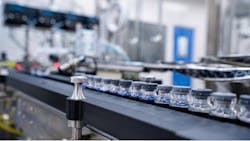Hans Scientific to invest $2B in US plants amid Trump’s threatened 100% pharma tariff
On the heels of President Donald Trump’s threat to impose a 100% tariff on branded or patented pharmaceutical products, Michigan-based contract manufacturer Hans Scientific announced it is investing $2 billion in new U.S. manufacturing infrastructure, including seven planned plants.
“The landscape of global drug manufacturing is shifting rapidly as new U.S. tariffs on pharmaceuticals create powerful incentives to move production stateside,” the company said in its announcement. “The move comes after President Trump announced 100% tariffs on branded pharmaceuticals, a policy designed to reduce reliance on foreign supply chains and capture tax revenue.”
Among Hans Scientific’s promised $2 billion investment, one of its seven planned plants is already complete — an injectable production facility including lyophilization capabilities. The company provides “all U.S.” manufacturing including contract lyophilization, contract injectables, water for Injection (WFI), and ultra-pure tankless water systems.
Hans Scientific contends that it is “uniquely positioned” to help pharmaceutical companies avoid tariff pressures, while securing domestic supply chains, and its ability to “design, fabricate and build its own facilities gives it a speed advantage over competitors.”
Trump in a Sept. 25 post on Truth Social said that starting Oct. 1 his administration will impose a 100% tariff on any branded or patented pharmaceutical product, unless the drugmaker “is building” their plant in the U.S., which he defined as breaking ground and/or under construction.
“Most drugs consumed in the U.S. are made overseas — not because it’s more efficient, but because of taxes,” Manoj Bhargava, founder of Hans Scientific, said in a statement. “With the recently announced tariffs, that equation changes. And once Congress recognizes tax avoidance as the driving force of manufacturing drugs overseas, tariffs on imported drugs will continue to rise.”
Generic drugs next?
At the same time, Bhargava warned that manufacturers of generic medicines should also expect rising tariffs.
“Remember, at one point, the U.S. government started with a 1% income tax. Now, the average American pays around 30% in income taxes,” Bhargava said.
Generics, which make up approximately 90% of prescription volume in the U.S., are produced primarily in India and represent a particularly vulnerable segment of the pharmaceutical supply chain. A recent analysis by U.S. Pharmacopeia (USP) found that generics come primarily from India, while the U.S. produces only 12% of the active pharmaceutical ingredients (API) for medicines going to patients in this country.
Ramnivas Mundada, director of economic research and companies at data and analytics firm GlobalData, said in a statement that the Indian pharmaceutical sector is bracing for significant changes.
“While the immediate impact on India’s core generic drug export business may be limited, as most generics are not directly targeted by these tariffs, significant risks remain,” Mundada said. “If the U.S. expands tariffs to encompass generic medicines in the future, it will directly affect India’s primary export category. Furthermore, Indian generic manufacturers, operating on thin profit margins, could find the U.S. market financially unviable if tariffs expand, potentially leading to reduced supply of affordable medicines.”
About the Author
Greg Slabodkin
Editor in Chief
As Editor in Chief, Greg oversees all aspects of planning, managing and producing the content for Pharma Manufacturing’s print magazines, website, digital products, and in-person events, as well as the daily operations of its editorial team.
For more than 20 years, Greg has covered the healthcare, life sciences, and medical device industries for several trade publications. He is the recipient of a Post-Newsweek Business Information Editorial Excellence Award for his news reporting and a Gold Award for Best Case Study from the American Society of Healthcare Publication Editors. In addition, Greg is a Healthcare Fellow from the Society for Advancing Business Editing and Writing.
When not covering the pharma manufacturing industry, he is an avid Buffalo Bills football fan, likes to kayak and plays guitar.
